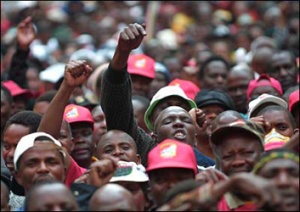Strikes hit South Africa ahead of World Cup

Port and rail workers in South Africa have walked out on strike, exactly one month before the FIFA World Cup is due to begin in the country.
As many as 18,000 workers represented by South African Transport and Allied Workers Union (Satawu) walked out at the state-owned transport company Transnet yesterday morning.
Transnet has approximately 56,000 employees.
Members of the rival United Transport and Allied Trade Union (Utatu) – which represents 21,000 employees at Transnet - are considering joining the action later today.
As a result of the action, a new Johannesburg fast commuter bus service initiated ahead of the World Cup kick-off on July 11th has been suspended.
The strike also halted rail services in Cape Town yesterday.
The dispute centres on which union would represent workers, with leaders stating they have no desire to strike during South Africa’s moment in the spotlight.
“Obviously, nobody is targeting the World Cup,” said Patrick Craven, spokesman for the Congress of South African Trade Unions.
“We don’t want to see any strikes during World Cup. We don’t want any strikes at all. Far better if we can resolve things through negotiations,” he added.
However, Mr Craven did also warn strikers would not give up their constitutional rights to industrial action.
ADVERTISEMENT
FIFA World Cup
The disruption follows earlier revelations from FIFA it was forced to inject $100 million of emergency funding into World Cup preparations in order to ensure deadlines were met.
FIFA general secretary Jerome Valcke – the man charged with running the World Cup for the Switzerland-based organisation – confirmed the additional funding had been granted following an executive committee meeting in March.
The funds were used by South Africans to ensure team training camps were ready, he revealed.
“We know we had to add some money for the team base camps where some teams were unhappy about the level of the services or the level of the pitches,” Mr Valcke confirmed in an interview with BBC Sport.
“That’s a cost FIFA took over to ensure that things were delivered on time.”

